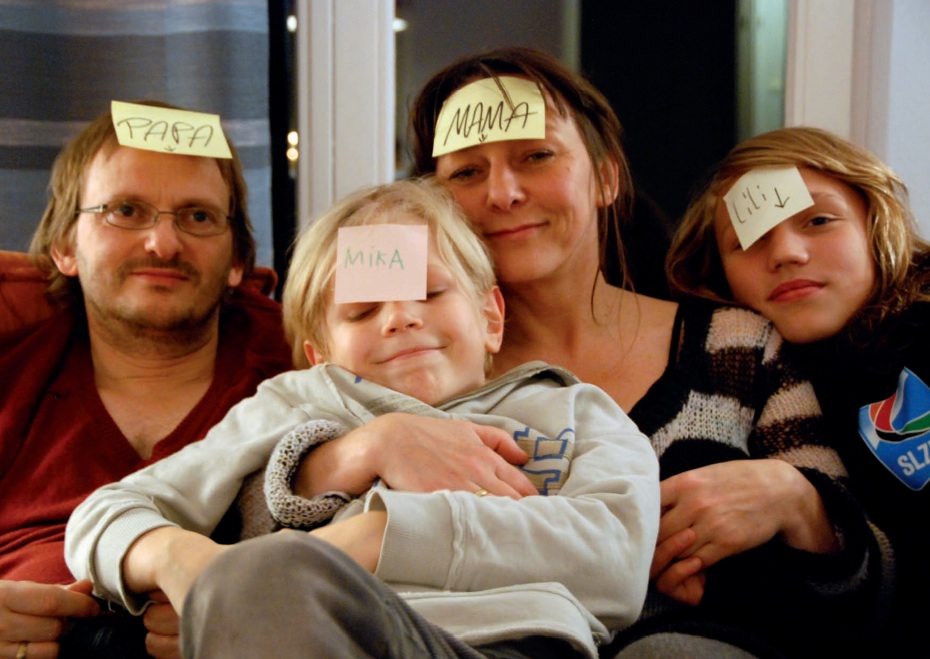« Berlinale 61 by Dorothea Holloway | Home | Timishort #3 »
Stopped on Track by Andreas Dresen – Cannes 64 Un Certain Regard Prize Winner
By Gregor Sedlag | May 30, 2011
- Note to oneselves in the face of death: When there is no father in heaven, is family the lender of last resort? Scene from “Stopped on Track” with Steffi Kühnert (Simone), Milan Peschel (Frank), Talisa Lilli Lemke (daughter) and Mika Nilson Seidel (son). Courtesy Festival de Cannes
The heavyweight Festival de Cannes is not the natural playground or showcase for German language film and, specifically, for German cinema. Thus, any entry in the festival’s Official Selection – be it the Competition or Un Certain Regard – is a distinction in itself. It consequently shows off with Andreas Dresen’s Halt auf freier Strecke (Stopped on Track) – awarded the Prix Un Certain Regard ex aequo with Arirang by Kim Ki-Duk.
This award isn’t obvious because the topic is neither entirely unique nor totally innovative in its realisation, but it demonstrates a remarkable sensitivity of the jury for the film’s hidden agenda which is inseparably connected with a universal tragedy of a first-hand account of the irrevocable decay and death of a family man from cancer. We are forced to follow a painfully and accurately staged decline of the forty-year-old Frank (Milan Peschel with an outstanding performance and intensity) – who becomes increasingly disassociated from his former life and all his loved ones: his wife, teenage daughter and younger son, parents, friends, colleagues – and even his own mind.
Just a few lighter moments interrupt the consistently destructive trail of the brain tumour‘s malicious work when we see Frank’s disease causing hallucinations that transform “his” tumour into a celebrity who achieves stardom on TV shows and is featured in official broadcast bulletins on the hopeless state of his health. With stunning cameos by German ARD stars like Late Night entertainer Harald Schmidt and Tagesschau anchormen, these particular mental sypmtoms of the disease are dramatised with an absurdly comic relief. And we get some compact scenes of “normal” family life among all the unbearable impositions the cancer causes for the increasingly frail Frank and his family, demonstrating that there is some light through “solidarity and dignity“ in a life trickling away without any hope.
And here we are at the tipping point of Stopped on Track, which leads us beyond a universal story and presents a meticulously narrated study of the milieu of former East German working-class people whose lives are, superficially and at times successfully – see the new suburban Reihenhaus! – following the West German welfare model, but are still characterised by their socialisation in the former GDR and the sweeping socio-economic turmoils of the 1990s after the fall of the Berlin Wall. Now, after 20 years of struggle and adjustment to the new economical system, life and the future looked so bright – and then the train is suddenly “stopped on the track” by the deadly diagnosis of cancer.
But, first and foremost, it is the total lack of any Christian religious tradition and ritual that unsettles the eye of the West German socialised spectator. For he could passively draw solace from a diffusive, yet still inevitable ancient background of traditional Christian rite of death and grief. The practically pagan post-socialist East German milieu cannot take refuge in the healing routine of warm and tender religious practice, but is literally mutterseelenallein (all alone) in the presence of death – dramatised perfectly in the painful absence of Frank’s mother as she escapes the inevitable.
Andreas Dresen studied at the HFF “Konrad Wolf ” Potsdam-Babelsberg in the former GDR and his work is often connected with the particular East German state of mind as seen in previous award-winning films like Halbe Treppe (Grill Point), Willenbrock or Sommer vorm Balkon (Summer in Berlin). When he decided to take on this project, he might have adopted the universal perspective of how modern societies are trying to ignore – or at least try to offload – the burden of death onto the individual human being and its closest personal surroundings.
But with his accurate (the new working conditions at the wife’s tram job or Frank’s privatised parcel service center) as well as his authentic (all medical personnel played by real people as themselves) direction, he focuses on a particular gap in German society which will probably last for decades – although we get a notion of the yet unburdened generation of the children through Frank’s daughter and son, who are the future and will certainly come to terms with their father’s death. Andreas Dresen himself describes Halt auf freier Strecke as “a story about death that celebrates life” – but in a society with no superior legitimate principle is sheer life strong enough to bear its burden – to withstand the pain?
Topics: Film Reviews, German Film | Comments Off on Stopped on Track by Andreas Dresen – Cannes 64 Un Certain Regard Prize Winner
Comments are closed.

